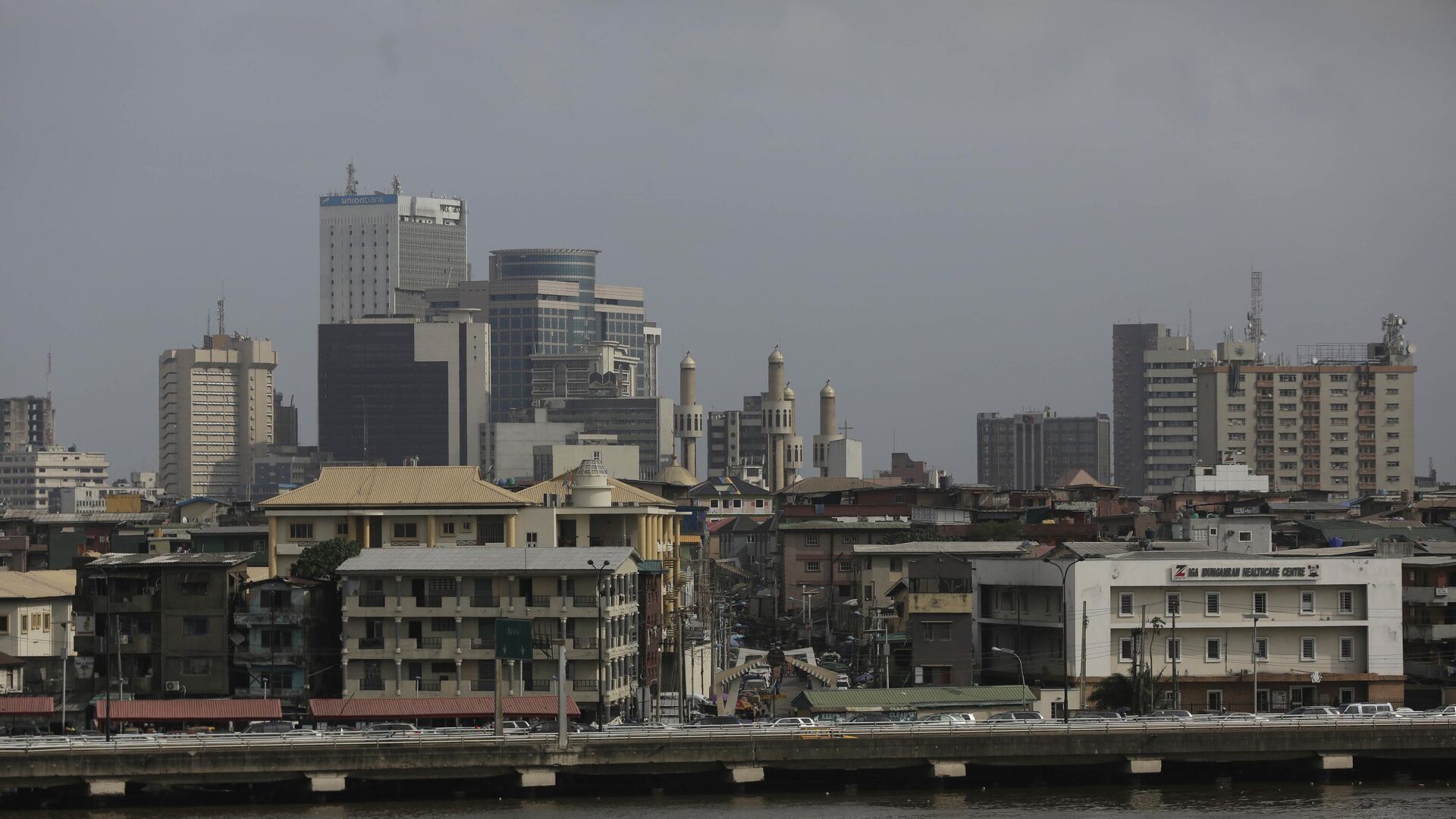https://en.sputniknews.africa/20231126/nigerias-central-bank-to-adopt-tighter-policy-to-fight-inflation-urges-increasing-capital-in-banks-1063794134.html
Nigeria's Central Bank to Adopt Tighter Policy to Fight Inflation, Urges Increasing Capital in Banks
Nigeria's Central Bank to Adopt Tighter Policy to Fight Inflation, Urges Increasing Capital in Banks
Sputnik Africa
In October, Nigeria's inflation rate reached 27.33%, marking a continuous rise for 10 consecutive months and the highest level in about 18 years. 26.11.2023, Sputnik Africa
2023-11-26T12:51+0100
2023-11-26T12:51+0100
2023-11-26T12:51+0100
west africa
sub-saharan africa
economy
nigeria
bank
central bank
banking
inflation
reforms
economic growth
https://cdn1.img.sputniknews.africa/img/07e7/0b/1a/1063794481_0:0:3072:1728_1920x0_80_0_0_b1fab6ed71cfff340fcff6ff51a1d84e.jpg
The new governor of the Central Bank of Nigeria (CBN), Olayemi Cardoso, has unveiled a strategy to tighten monetary policy over the next two quarters to address the persistent rise in inflation. The CBN is also instructing banks to bolster their capital reserves to support the expansion of the West African country's economy.Addressing the immediate challenge of containing excess liquidity and combating inflation, Cardoso emphasized the necessity for policy adjustments.He outlined a direction that calls for an end to direct fiscal intervention, aiming to clarify the distinction between monetary and fiscal policy and discontinuing policies pursued by his predecessor, Godwin Emefiele.Cardoso also expressed optimism about Nigeria's economic potential, projecting growth to $1 trillion within the next seven years. Furthermore, he stressed the importance of increasing the capital of banks to facilitate their participation in a larger economy.Notably, Nigeria's $240 billion economy exhibited a 2.5% growth in the third quarter, with the dominant oil sector contracting at a slower pace and pending government reforms yet to take full effect. Cardoso forecasts 3.9% growth for Africa's largest economy in the fourth quarter.As part of the reform agenda, Cardoso pledged to focus on restoring confidence in the regulatory framework. Emphasizing liquidity management to fight inflation, reduce high-interest rates, and stabilize the exchange rate, he assured investors of "significant stability in the short to medium term as we recalibrate our policy toolkit and implement far-reaching measures."The CBN's efforts align with new Nigerian President Bola Tinubu's sweeping reforms, including the removal of a costly petrol subsidy and an overhaul of the country's multiple exchange rate system. Cardoso underscored the contribution of these reforms in promoting exchange rate stability and macroeconomic stability.To combat inflation, the CBN has aggressively raised interest rates by more than 700 basis points since last year. Cardoso noted a decline in month-on-month inflation and emphasized measures to ensure that these changes in interest rates have a real impact on the economy.In early November, the CBN began settling overdue foreign exchange forwards, estimated at about $7 billion, purchased by companies from local lenders. This initiative aimed to ease pressure on the Nigerian naira, which had sharply depreciated on the unofficial black market.Looking ahead, Cardoso announced plans to develop new foreign exchange guidelines, intending to enable market forces to determine exchange rates. The governor emphasized the central bank's commitment to establishing clear, transparent, and harmonized rules governing market operations.
https://en.sputniknews.africa/20231123/nigeria-aims-to-join-brics-within-two-years-foreign-minister-says-1063747338.html
https://en.sputniknews.africa/20231123/ex-central-bank-of-nigeria-governor-accused-of-corruption-released-on-bail-1063739312.html
west africa
nigeria
Sputnik Africa
feedback@sputniknews.com
+74956456601
MIA „Rossiya Segodnya“
2023
Muhammad Nooh Osman
https://cdn1.img.sputniknews.africa/img/07e7/04/0a/1058467512_0:0:1280:1280_100x100_80_0_0_ec723833bcbfcaed2e21952965ad99e4.jpg
Muhammad Nooh Osman
https://cdn1.img.sputniknews.africa/img/07e7/04/0a/1058467512_0:0:1280:1280_100x100_80_0_0_ec723833bcbfcaed2e21952965ad99e4.jpg
News
en_EN
Sputnik Africa
feedback@sputniknews.com
+74956456601
MIA „Rossiya Segodnya“
Sputnik Africa
feedback@sputniknews.com
+74956456601
MIA „Rossiya Segodnya“
Muhammad Nooh Osman
https://cdn1.img.sputniknews.africa/img/07e7/04/0a/1058467512_0:0:1280:1280_100x100_80_0_0_ec723833bcbfcaed2e21952965ad99e4.jpg
west africa, economy, nigeria, bank, central bank, banking, inflation, reforms, economic growth, bola tinubu
west africa, economy, nigeria, bank, central bank, banking, inflation, reforms, economic growth, bola tinubu
Nigeria's Central Bank to Adopt Tighter Policy to Fight Inflation, Urges Increasing Capital in Banks
Muhammad Nooh Osman
Writer/Editor
In October, Nigeria's inflation rate reached 27.33%, marking a continuous rise for 10 consecutive months and the highest level in about 18 years.
The new governor of the Central Bank of Nigeria (CBN), Olayemi Cardoso, has unveiled a strategy to tighten monetary policy over the next two quarters to address the persistent rise in inflation.
The CBN is also instructing banks to bolster their capital reserves to support the expansion of the West African
country's economy.
Addressing the immediate challenge of containing excess liquidity and combating inflation, Cardoso emphasized the necessity for policy adjustments.
He outlined a direction that calls for an end to direct fiscal intervention, aiming to clarify the distinction between monetary and fiscal policy and discontinuing policies pursued by his predecessor,
Godwin Emefiele.
"[The CBN has] approved the adoption of an explicit inflation-targeting framework to enhance the effectiveness of our monetary policy... Details and requirements for this framework are currently being finalised along with the fiscal authorities," Cardoso said.
Cardoso also expressed optimism about Nigeria's economic potential, projecting growth to $1 trillion within the next seven years. Furthermore, he stressed the importance of increasing the capital of banks to facilitate their participation in a larger economy.
Notably, Nigeria's $240 billion economy exhibited a 2.5% growth in the third quarter, with the dominant
oil sector contracting at a slower pace and pending government reforms yet to take full effect. Cardoso forecasts 3.9% growth for Africa's largest economy in the fourth quarter.
"The Central Bank of Nigeria is fully committed to ensuring price stability and financial system stability," the head of the CBN said. "We will tackle institutional deficiencies, restore corporate governance, strengthen regulations and implement prudent policies."
As part of the reform agenda, Cardoso pledged to focus on restoring confidence in the regulatory framework. Emphasizing liquidity management to fight inflation, reduce high-interest rates, and stabilize the exchange rate, he assured
investors of "significant stability in the short to medium term as we recalibrate our policy toolkit and implement far-reaching measures."
The CBN's efforts align with new Nigerian President Bola Tinubu's sweeping reforms, including the removal of a costly petrol subsidy and an overhaul of the country's multiple exchange rate system. Cardoso underscored the contribution of these reforms in promoting exchange rate stability and macroeconomic stability.
To combat inflation, the CBN has aggressively raised interest rates by more than 700 basis points since last year. Cardoso noted a decline in month-on-month inflation and emphasized measures to ensure that these changes in interest rates have a real impact on the economy.
In early November, the CBN
began settling overdue foreign exchange forwards, estimated at about $7 billion, purchased by companies from local lenders. This initiative aimed to ease pressure on the Nigerian naira, which had sharply depreciated on the unofficial black market.
"These payments will continue until obligations are cleared," he said. "New foreign exchange guidelines will be developed and extensive consultations will be done with banks and FX operators before implementing any new requirements."
Looking ahead, Cardoso announced plans to develop new foreign exchange guidelines, intending to enable market forces to determine exchange rates. The governor emphasized the central bank's commitment to establishing clear, transparent, and harmonized rules governing market operations.




